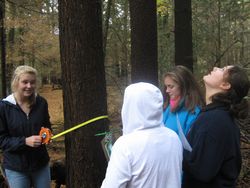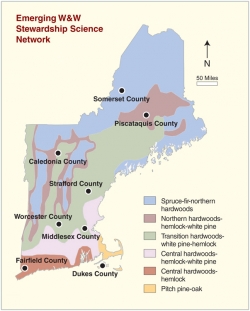You are here
W&W Stewardship Science
There are remarkably few rigorous, long-term evaluations of how forestry and conservation management practices affect forests in the eastern United States.
What is Stewardship Science?
Stewardship Science is just one part of the Wildlands and Woodlands forest conservation vision for New England. With the Stewardship Science initiative, we have created a simple, easy-to-use manual for landowners, students, and other groups to establish permanent, paired research plots in conserved woodlands and wildlands.
Results from these studies can shed light on the long-term impacts and effectiveness of management practices that seek to:
- promote certain characteristics (e.g. specific species, assemblages, or structure, etc.)
- enhance ecosystem services (e.g. carbon sequestration, water production, etc.)
- yield desired products (e.g. biomass, quality timber, etc.)
 The project not only provides valuable ecological and silvicultural insights, but is also an exciting outreach tool for engaging students and the public in the importance and enjoyment of ecological research. All involved gain longer-term perspectives on ecological processes, land stewardship, and land conservation.
The project not only provides valuable ecological and silvicultural insights, but is also an exciting outreach tool for engaging students and the public in the importance and enjoyment of ecological research. All involved gain longer-term perspectives on ecological processes, land stewardship, and land conservation.
Interested?
Get Involved!
Ongoing Work
 Over the past 6 years, a growing number of groups throughout New England have begun employing the Stewardship Science approach to enhance a wide variety of scientific, educational, and management objectives on their conserved and variously managed lands.
Over the past 6 years, a growing number of groups throughout New England have begun employing the Stewardship Science approach to enhance a wide variety of scientific, educational, and management objectives on their conserved and variously managed lands.
This map shows 8 pilot sites, which include collaborations between private citizens, towns, land trusts, conservation organizations, foundations, universities, schools, and state governments. The landscapes represent a wide range of forest types in remote, rural, and suburban locations.
We encourage interested landowners, organizations, scientists, and others to get involved by establishing their own monitoring plots, making use of data from existing sites, or becoming a regional representative in their area.
We also welcome participation by K-12 schools in this work, through the "Our Changing Forests" project in the Harvard Forest Schoolyard Ecology Program.

